
Journal of Urban Mobility
Scope & Guideline
Exploring the Future of City Mobility
Introduction
Aims and Scopes
- Sustainable Urban Mobility Solutions:
The journal emphasizes research on sustainable transportation methods, including public transit, cycling, walking, and emerging technologies like autonomous vehicles and shared mobility services. - Participatory and Community-Centric Approaches:
A core aim is to promote participatory design and stakeholder engagement in urban mobility planning, recognizing the importance of community involvement in creating effective mobility solutions. - Socio-Technical Transitions and Policy Analysis:
The journal examines the socio-technical factors influencing urban mobility, including the impact of policies, regulations, and societal changes on transportation systems. - Data-Driven Insights and Modelling:
Utilizing advanced data analytics, the journal publishes studies that model transportation behaviors and assess urban mobility systems, aiding in informed decision-making for urban planners. - Equity and Accessibility in Urban Transport:
Research focusing on social equity and accessibility ensures that urban mobility solutions cater to diverse populations, including marginalized groups, to promote inclusivity.
Trending and Emerging
- 15-Minute City Concept:
The 15-minute city model, promoting accessibility within a short walking distance, has gained significant attention, highlighting the importance of local services and reducing reliance on cars. - Autonomous and Shared Mobility Technologies:
Research exploring the integration of autonomous vehicles and shared mobility services is rapidly emerging, signaling a shift towards innovative transport solutions that enhance urban mobility. - Impact of COVID-19 on Urban Mobility:
The pandemic has catalyzed studies examining changes in public transport use, social distancing measures, and the long-term implications for urban mobility strategies. - Equity and Social Justice in Mobility Planning:
An increased focus on mobility equity emphasizes the need for inclusive transport solutions that address the needs of underrepresented communities and promote social justice. - Data-Driven Decision Making:
There is a growing trend towards utilizing big data and advanced analytics to inform urban mobility planning, enhancing the ability to model behaviors and predict transport needs.
Declining or Waning
- Traditional Car-Centric Models:
There has been a noticeable reduction in research centered around traditional car-centric urban mobility models, as the focus shifts towards sustainable and multi-modal transportation systems. - Static Infrastructure Planning:
Research emphasizing static infrastructure solutions without considering dynamic and adaptable urban designs has become less prominent, as cities increasingly require flexible approaches to mobility. - Conventional Public Transport Systems:
Studies that solely analyze conventional public transport systems, without integrating new technologies or mobility innovations, are appearing less frequently as the field embraces more comprehensive approaches.
Similar Journals
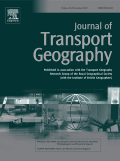
Journal of Transport Geography
Pioneering Research in Transport Systems and Spatial AnalysisThe Journal of Transport Geography, published by Elsevier Ltd, stands as a premier international platform for the dissemination of research at the intersection of transportation and geography. Established in 1993, this journal explores critical issues in transport systems, spatial analysis, and environmental impacts, providing invaluable insights for academics, policymakers, and industry practitioners. With an impressive impact factor and ranking within the top quartiles across multiple categories including Environmental Science and Geography, Planning and Development, the journal is recognized for its rigorous peer-review process and high-quality contributions. As it converges towards the target year of 2024, the Journal of Transport Geography continues to serve as an essential resource for understanding the challenges and innovations shaping transportation landscapes globally. Access to its research is available through traditional subscription models, reinforcing its commitment to supporting the advancement of knowledge in this vital field.
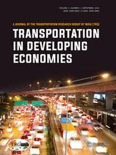
Transportation in Developing Economies
Advancing sustainable transport solutions for emerging economies.Transportation in Developing Economies is a premier academic journal published by SPRINGER INT PUBL AG, specializing in the interdisciplinary study of transportation systems in developing nations. With an ISSN of 2199-9287 and an E-ISSN of 2199-9295, this journal provides an essential platform for researchers, policymakers, and practitioners to explore the unique challenges and innovations in transportation infrastructure, mobility, and planning within emerging economies. The journal aims to critically assess and promote sustainable transport solutions that cater to the socio-economic dynamics of these regions, making it an invaluable resource for those invested in equitable transportation development. With its open access philosophy, it ensures widespread dissemination of research findings, fostering collaboration and knowledge exchange among scholars and industry professionals alike. As the global focus on sustainable practices intensifies, Transportation in Developing Economies stands at the forefront of vital research, contributing to both academic discourse and pragmatic advancements in the field.
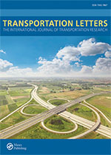
Transportation Letters-The International Journal of Transportation Research
Bridging theory and practice in transportation studies.Transportation Letters - The International Journal of Transportation Research, published by Taylor & Francis Ltd, is a leading journal dedicated to advancing the field of transportation studies. With an impact factor that reflects its significance within the academic community and a prestigious ranking of Q2 in Transportation, this journal provides a critical forum for the dissemination of innovative research and insights in transportation systems, policies, and technologies. Covering a broad scope of topics from urban mobility to logistics and infrastructure, Transportation Letters serves as an essential resource for researchers, professionals, and students aiming to deepen their understanding of transportation issues facing society today. With over a decade of publication since 2009, the journal has established a solid reputation, ranking 46th out of 141 in Scopus's transportation category, placing it in the 67th percentile. Although it does not operate under an open-access model, it remains committed to accessibility through various subscription options, ensuring that vital research is available to those shaping the future of transportation.
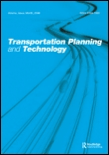
TRANSPORTATION PLANNING AND TECHNOLOGY
Advancing the Future of Urban MobilityTransportation Planning and Technology is a prestigious academic journal dedicated to advancing the fields of transportation planning and technology. Published by Taylor & Francis Ltd, this journal serves as a critical platform for disseminating high-quality research and innovative practices in the context of urban and regional transportation systems. With an ISSN of 0308-1060 and an E-ISSN of 1029-0354, the journal has established a significant foothold since its inception in 1972, spanning through to 2024. Recognized in the Q2 category of Geography, Planning and Development and the Q3 category of Transportation in the 2023 rankings, it reflects a solid impact factor supported by its Scopus classifications, holding a rank of #270/821 in Geography, Planning and Development and #72/141 in Transportation. Researchers, professionals, and students alike benefit from the journal's comprehensive scope, which encompasses theoretical aspects, practical applications, and policy implications related to transportation systems. As an essential resource in the field, it invites contributions that enhance our understanding of the complexities in transportation planning, making it a must-read for those engaged in related studies.
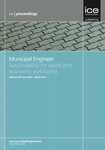
PROCEEDINGS OF THE INSTITUTION OF CIVIL ENGINEERS-MUNICIPAL ENGINEER
Elevating Standards in Municipal Engineering PracticesPROCEEDINGS OF THE INSTITUTION OF CIVIL ENGINEERS-MUNICIPAL ENGINEER is a prestigious journal dedicated to advancing the field of civil and structural engineering, specifically within the municipal context. Published by Emerald Group Publishing Ltd, this journal has established itself as a key resource for engineers, researchers, and educators seeking to explore innovative practices and emerging trends in urban infrastructure and public works. With a Scopus Rank of 160 out of 379, placing it in the 57th percentile and categorized in Q3 for 2023, it reflects its relevance and contribution to the scholarly community. The journal publishes high-quality research findings that aim to address the complex challenges faced in municipal engineering, making it an invaluable asset for those looking to inform their practices with cutting-edge knowledge. Although it offers traditional access options, the importance of its contributions to engineering solutions makes the journal an essential read for anyone involved in the design, construction, and management of municipal projects. Authors are encouraged to submit their work and contribute to shaping the future of civil engineering through this well-regarded publication, which has been converging expertise since 1992.

TeMA-Journal of Land Use Mobility and Environment
Shaping urban planning through critical insights and collaboration.TeMA - Journal of Land Use Mobility and Environment is a distinguished open-access journal published by the University of Naples Federico II, specifically by the Department of Planning and Territorial Science. Since its inception in 2008, the journal has dedicated itself to advancing the field of land use, mobility, and environmental studies, providing a platform for innovative research that shapes urban planning and environmental management practices. With an ISSN 1970-9889 and E-ISSN 1970-9870, the journal is committed to offering high-quality, peer-reviewed articles that address critical issues impacting society. Although currently positioned in the lower percentiles of Scopus rankings across various categories, including Geography, Planning and Development and Environmental Science, it plays a vital role in disseminating knowledge that is essential for researchers, policy-makers, and practitioners in these disciplines. Nestled in the heart of Naples, Italy, at Piazzale Tecchio 80, TeMA invites submissions from scholars around the world, fostering a collaborative atmosphere that emphasizes the importance of sustainable land use and mobility in the contemporary environment.

Transportation Research Interdisciplinary Perspectives
Transforming Transportation Through Open Access KnowledgeTransportation Research Interdisciplinary Perspectives, published by ELSEVIER, serves as a leading journal in the field of transportation research, with a pronounced interdisciplinary approach that fosters dialogue between diverse fields including automotive engineering, civil and structural engineering, and urban studies. Since its inception in 2019, the journal has swiftly gained recognition, achieving a prestigious Q1 classification across multiple relevant categories such as Environmental Science, Geography, and Management Science in 2023, reflecting its robust impact factor and significance within the academic community. By offering Open Access since its launch, the journal ensures broad accessibility to critical research findings, supporting global collaboration and innovation. Recognized globally with impressive Scopus rankings—such as #4 in Urban Studies and #6 in Automotive Engineering—this journal is a vital resource for researchers, professionals, and students committed to driving advancements within the complex interplay of transportation systems. Whether exploring sustainable practices, infrastructural innovations, or socio-economic implications of transport policies, Transportation Research Interdisciplinary Perspectives is at the forefront of shaping the future of mobility and transportation science.
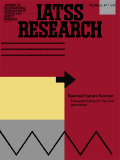
IATSS Research
Elevating engineering insights to enhance urban living.IATSS Research, published by Elsevier Science Ltd, stands as a premier open-access journal at the intersection of engineering, safety research, urban studies, and transportation. Established in 2000, this esteemed journal caters to a diverse audience of researchers, industry professionals, and students eager to delve into innovative research that addresses pressing societal challenges. With an impressive impact factor and a consistent demonstration of high-quality scholarship, IATSS Research has achieved notable rankings within Scopus, including a top-tier position in Safety Research (Rank #13/109, 88th percentile) and Engineering (Rank #46/307, 85th percentile). The journal has evolved significantly since its inception, reflecting the dynamic nature of its converged fields from 2008 to 2024. By embracing open access, IATSS Research amplifies the reach of critical findings and fosters collaboration across disciplines, making it an invaluable resource for anyone invested in advancing knowledge and practices in modern engineering and urban safety.
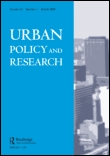
Urban Policy and Research
Enhancing Understanding of Urban Dynamics and DevelopmentUrban Policy and Research is a leading academic journal dedicated to advancing the fields of urban studies and geography, planning, and development. Published by Routledge Journals, Taylor & Francis Ltd, the journal has been a vital resource since its inception in 1982 and continues to shape scholarly discourse up to 2024. With an impressive 2023 Scopus ranking that places it in the 70th percentile for Urban Studies and 63rd percentile for Geography, Planning and Development, it reflects a strong commitment to rigorous research and innovative insights. Although not an open-access journal, it provides valuable access options to support the dissemination of knowledge among researchers, professionals, and students. By engaging with a diverse range of topics, Urban Policy and Research serves as an essential platform for exploring contemporary urban challenges and fostering informed policymaking in an evolving global landscape.
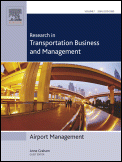
Research in Transportation Business and Management
Advancing Knowledge in Transportation Strategies.Research in Transportation Business and Management is a prominent academic journal published by ELSEVIER that specializes in the interdisciplinary analysis of transportation business practices and management strategies. With an ISSN of 2210-5395 and an E-ISSN of 2210-5409, this journal has established itself as a critical resource in the fields of business, management, and transportation studies. It boasts an impressive Q1 ranking across multiple categories, including Business and International Management, Decision Sciences, and Management Science, indicating its top-tier status among peer-reviewed journals. The journal serves as a platform for innovative research and theoretical advancements, welcoming contributions that address contemporary challenges and emerging trends in transportation systems. Although it operates with subscription access, the journal’s comprehensive analyses and empirical studies are essential for researchers, professionals, and students aiming to understand the complex interface of transportation, commerce, and policy-making. Located in Amsterdam, Netherlands, Research in Transportation Business and Management is committed to facilitating the exchange of knowledge and insights within this evolving and vital sector up to the year 2024.